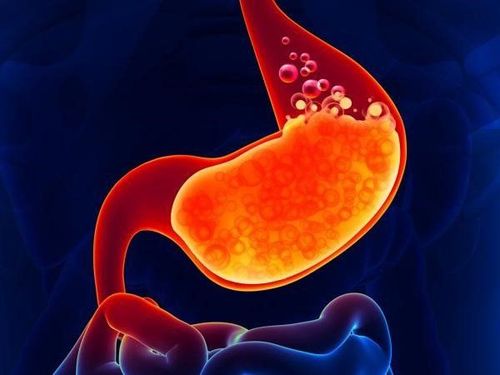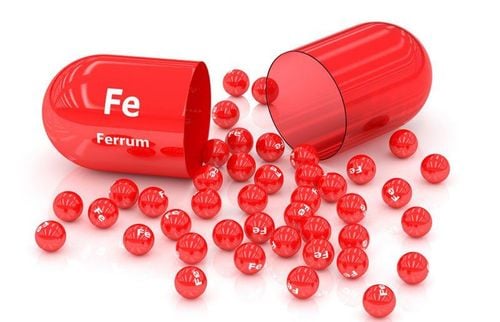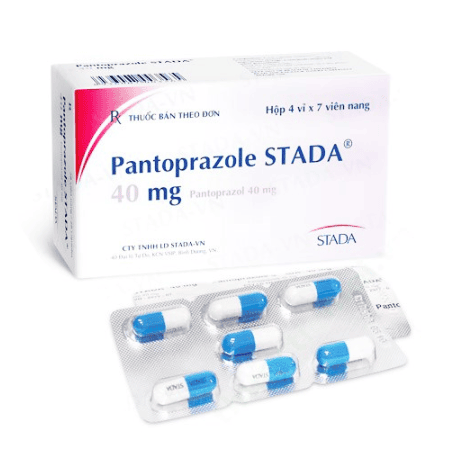This is an automatically translated article.
Iron is one of the minerals needed to replenish the blood and support the body's basic vital activities. The process of absorbing iron after drinking usually takes place in the stomach, so many people ask the question whether taking iron is harmful to the stomach?
1. The role of iron
Iron is one of the essential minerals for the vital activities of the human body. This mineral makes up about 0.004% of each cell. The body is supplemented with enough iron will help the synthesis of hemoglobin and myoglobin be easier. In particular, hemoglobin plays the role of transporting oxygen to the cells and myoglobin is responsible for storing the oxygen needed by the body. At the same time, the mineral iron is also an important constituent of cell nucleus and catalytic enzymes, promoting and enhancing a healthy immune system. In addition, iron also supports children's bodies to develop in a stable and healthy way, contributing to reducing menstrual pain, fatigue, helping the body release energy,... Women Women during pregnancy need to supplement with iron every day.2. Is taking iron harmful to the stomach?
Through the above benefits, it can be seen that the reasonable amount of iron that the body needs every day will help our health condition improve markedly. With outstanding advantages, iron minerals are currently attracting a lot of attention from consumers, especially pregnant mothers and families with young children. However, many people wonder if taking iron is harmful to the stomach? Or taking iron on an empty stomach is it harmful?
Doctors say taking iron will not harm the body's stomach. To answer this question, they need to understand the mechanism of oral iron absorption. Although our bodies absorb iron starting right in the stomach, this process mainly takes place in the duodenal bulb and the first part of the small intestine (to a small part). A series of chemical reactions will take place to turn iron from the ferric Fe3+ form to the ferrous Fe2+ form. When the transformation is complete, ferrous Fe2+ will be gradually absorbed by the body and converted to the parts that need iron minerals to perform basic life activities inside the body.
For iron deficiency cases, most of the iron will be absorbed by the body through the brush border, moving to the intestinal mucosal cells, blood and then to the portal vein. When the body has an excess of iron, this process will happen in reverse, the amount of iron absorbed will be reduced.
However, patients with underlying medical conditions such as peptic ulcer, ileitis or chronic ulcerative colitis should be cautious before taking iron into the body. Iron supplementation when suffering from these diseases may cause some side effects in the digestive system such as nausea, abdominal pain, black stools, constipation. In rare cases, the patient may also develop a skin rash or blacken teeth.

Giải đáp uống sắt có hại dạ dày không?
3. Notes when taking iron
In order to maximize the effectiveness of iron supplementation, users should keep the following notes in mind:
Do not drink beverages such as coffee, tea or carbonated soft drinks: These drinks cause the steaming process to occur. The body's iron absorption is hindered Do not take calcium with iron pills at the same time: Taking calcium supplements at the same time will affect the body's iron absorption process. You need to pay attention to the dose as well as the time of taking to avoid the two substances interfering with each other's absorption. Calcium should be supplemented after iron about 1-2 hours. Should take iron supplements on an empty stomach: Many people are concerned that taking iron on an empty stomach will harm the stomach, but in fact, iron supplementation on an empty stomach is the best time for the body to absorb it. On the contrary, supplementing with iron after meals will interfere with and interrupt the body's iron absorption process. Iron should be taken 1-2 hours before or after a meal, combined with plenty of water (at least half a cup). Iron supplements should not be taken while taking antibiotics of the quinolones, tetracyclines, antacids, thyroid hormones. Children under 12 years of age and the elderly should avoid iron supplements in pill form, instead taking drops or syrups. Should take the correct dose recommended for each age. Should supplement iron with vitamin C: Vitamin C has the ability to reduce Fe3+ into Fe2+, making it easier for iron to be absorbed into the body. So you can drink more orange juice to help the body absorb iron in the best way. Most people probably don't need to worry about whether taking iron is harmful to the stomach because this is an essential substance for the body, safe for the stomach when supplementing with iron orally. However, people with stomach-related diseases also need to be cautious and consult a doctor before taking any supplements to avoid possible side effects.
Follow Vinmec International General Hospital website to get more health, nutrition and beauty information to protect the health of yourself and your loved ones in your family.
Please dial HOTLINE for more information or register for an appointment HERE. Download MyVinmec app to make appointments faster and to manage your bookings easily.













